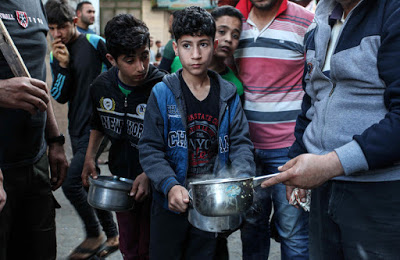Struggling to survive at Ramadan
 |
| Rami Almeghari 20 May 2019 |
Nasser Rabah, a writer living in Gaza, has invented a character who turned off his refrigerator to spend less on energy.
The man was depicted as miserly, rather than poor. Yet economic circumstances have recently forced the author to take the same step as his fictional character.
“I never imagined that I would have to disconnect my own refrigerator,” Rabah said. “I often have no food in it.”
Rabah makes little money from his writing. His main source of income is from working as an agricultural engineer for the Palestinian Authority.
Over the past few years, the PA has drastically reduced payments to its employees in Gaza.
Approximately 38,000 of the PA’s Gaza workers received no wages in April. Although some money was transferred in early May, employees complain that it is not sufficient to meet their expenses during Ramadan.
Rabah is among those who has to mark the holy month in a frugal way. He used to celebrate the beginning of Ramadan by hosting iftar – the evening meal after a day of fasting – for his siblings at his home in Maghazi refugee camp.
“But for two years now, I have not even been able to provide good food for my own children,” he said. Rabah has six children, two of whom are unemployed college graduates, one now in university and three still in school.
The wage cuts have taken place against the backdrop of protracted disputes between Fatah, the dominant party in the PA, and Hamas, which is nominally in charge of Gaza’s internal affairs.
“The PA wants to punish and squeeze Hamas, while in fact it has punished us, the employees,” said Rabah. “Why are these measures continuing, when we are the ones suffering, not Hamas?”
“Unbearable situation”
Nael Hamad, another resident of Maghazi camp in central Gaza, offers the same analysis. “By imposing these unjustified cuts, the Palestinian Authority has opened fire on us, not on Hamas,” he said.
Hamad has long worked for the PA’s religious affairs ministry.
Until 2017, he was able to provide his family with a good supply of fruit, meat and qatayef – stuffed pancakes that are particularly popular when ending the daily fasts during Ramadan.
“I don’t think I will be able to buy any sweets or fruit this year,” Hamad said.
Visiting family members with gifts is an important tradition for Ramadan. Last year, however, Hamad had to go and see his sisters empty-handed. He is unable to make charitable donations, something which he made a point of doing in the past.
“This is such an abnormal and unbearable situation,” he added.
The cuts have been introduced at a time when hardship is generally becoming more severe in Gaza, which has been under an Israeli siege for more than a decade. The rate of unemployment rose from 44 percent in 2017 to 52 percent in 2018. Almost 70 percent of households have encountered major difficulties in securing enough food to live healthily.
“Nothing but cheese”
As the occupying power, Israel must shoulder the blame for the suffering inflicted on Palestinians in Gaza. Yet the rival parties Fatah and Hamas have exacerbated that suffering, too.
In 2014, the two parties decided to form a “national unity” government. Yet they were unable to overcome their differences, with the result that the PA did not assume responsibility for paying public sector employees hired by Hamas in Gaza.
For the past few years, the Hamas administration in Gaza has cut the salaries of those workers.
Muhammad Dalloul, a social worker living in the Zeitoun neighborhood of Gaza City, is among those affected.
Dalloul has two children. For two consecutive weeks during Ramadan in 2018, Dalloul was unable to afford meat, fish or fruit. On many evenings, the family had to make do with fried potatoes, accompanied by some other basic items, for their iftar.
“That type of food does not make you strong enough for your religious duties during Ramadan,” he said.
His family sometimes had to survive on packets of cheese bought from a local grocer for about 50 cents each. “We had cheese, nothing but cheese,” Dalloul said.
Acts of kindness have given a lifeline to many people in Gaza. Dalloul recalls how last year during Ramadan he received a gift from someone he did not know. It contained dates, olive oil, cheese and a variety of canned foods.
“It is only with God’s blessings that we get by,” he said. “We need a change that improves our lives in this part of the world. Politicians have a big responsibility.”
Rami Almeghari is a journalist and university lecturer based in Gaza.


